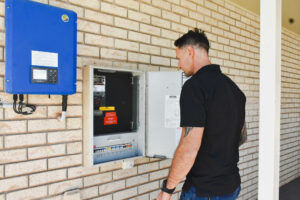Harness the Sunshine Coast’s Power: A Guide to Residential Solar
Are you tired of soaring electricity bills and looking for a more sustainable and cost-effective energy solution? Solar power is a fantastic option for homeowners on the Sunshine Coast, thanks to our region’s abundant sunlight. In this guide, we’ll explore the benefits of solar energy, help you determine if it’s right for your home, and provide valuable information to make an informed decision.
Why the Sunshine Coast is Ideal for Solar:
With its sunny climate and increasing energy costs, the Sunshine Coast is the perfect location to embrace solar power. Our region’s abundant sunlight ensures that solar panels can generate significant amounts of electricity throughout the year. This not only reduces your reliance on the grid but also helps you save money on your energy bills.
Evaluating Your Roof for Solar Installation:
Before making the switch to solar, it’s essential to assess your roof’s suitability. Here are the key factors to consider:
- Orientation: North-facing roofs are ideal, but east- or west-facing roofs can also work well with the right tilt.
- Shade: Ensure there are no obstructions, such as trees or buildings, that will cast shadows on your panels.
- Roof Condition: Your roof should be in good repair and able to support the weight of the solar panels.
- Space: There should be enough unobstructed space on your roof to accommodate the desired number of panels.
Understanding Solar Panel Costs:
While there’s an upfront investment in solar panels, the long-term savings on electricity bills can make it a worthwhile investment. Factors like panel efficiency, system size, and government incentives will influence the total cost.
Government Incentives and Rebates:
The Queensland government offers various incentives to encourage solar adoption, including:
- Small-Scale Renewable Energy Scheme (SRES): Receive STC (Small-scale Technology Certificates) that can be sold for a cash rebate.
- Feed-in tariffs: Earn money by selling excess solar power back to the grid.
Choosing the Right Solar System:
There are two main types of solar systems:
- Grid-tied: Connect to the grid for backup power and to sell excess electricity.
- Off-grid: Completely independent of the grid, requiring battery storage for nighttime or cloudy day use.
Solar Batteries: Storing Excess Energy
Consider adding a solar battery to store excess energy for use during periods of low sunlight or high demand. This can further reduce your reliance on the grid and increase your energy independence.
Solar Panel Maintenance and Warranties:
Solar panels require minimal maintenance, but regular inspections and cleaning are recommended to ensure optimal performance. Most solar panels come with warranties that cover defects and performance issues.
Switching to solar power is a smart investment for Sunshine Coast homeowners looking to reduce their energy costs, reduce their carbon footprint, and increase their energy independence. By carefully considering your roof suitability, understanding the financial aspects, and choosing a reputable solar installer, you can harness the power of the sun to benefit your home and the environment.
Contact Element Power today for a free consultation and to learn more about how solar can benefit your Sunshine Coast home.











